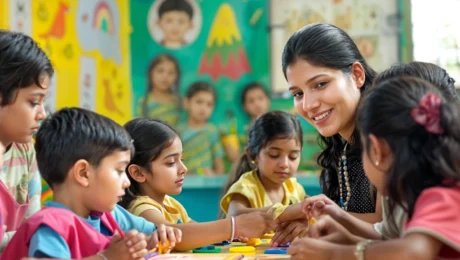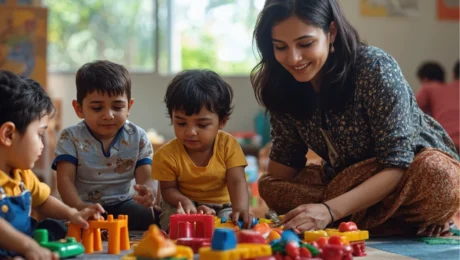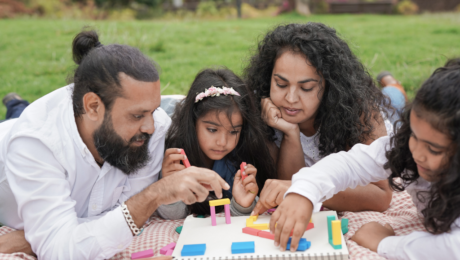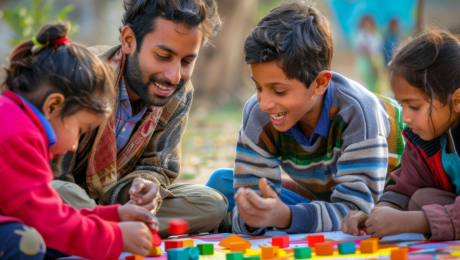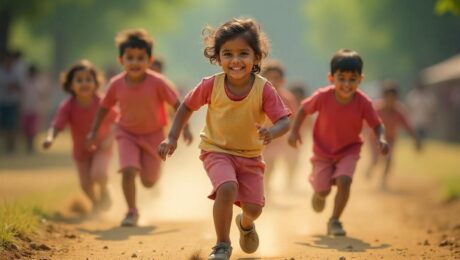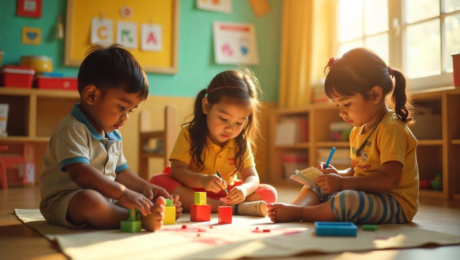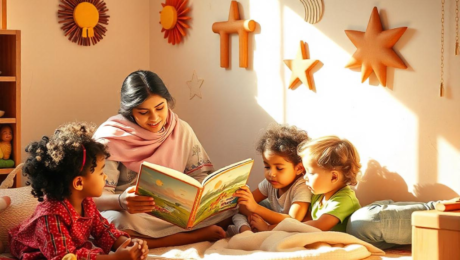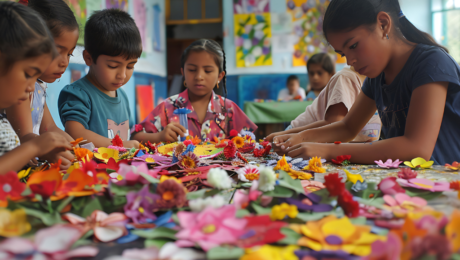Best Pre Schools in Noida: Where Little Learners Shine!
“Which are the best pre schools in Noida for my child?” As parents of little ones, this question often crosses our minds—and rightfully so, as there are so many options available. Especially when it’s about laying the foundation for your little one’s future, we need to be extra careful while making the right choice.
A preschool is not just a place for learning ABCs and 123s. It’s the place where children learn, play, make friends, and develop essential life skills in a safe and nurturing environment. The right preschool can spark curiosity, boost confidence, and prepare kids for a lifetime of learning. In this article, we will learn about the top 5 best pre schools in Noida and why it is essential to enroll your kid in the best preschool. So, let’s get started!
Why is it Important to Choose the Best pre schools in Noida for Your Child
Here’s why it is important to choose the best preschool for your child:
- Early Learning Shapes Future Success: According to some research, brain development happens mostly during the early years. pre schools that deliver proper educational structure help children build problem-solving abilities along with creativity and communication skills. Early literacy learning and numeracy abilities of children develop naturally through play-based learning experiences which they do not perceive as formal studying.
- Social and Emotional Growth: Well-designed preschool settings promote children to meet with peers while learning sharing and collaborative behaviors that lead to friendship formation. Such an environment enables children to build important social skills including empathy while learning teamwork behavior.
- Preparation for Formal Education: A transitional journey from home to formal school environments produces overwhelming feelings in young children. Quality preschool programs assist students in shifting between home and more structured settings through disciplined daily activities mixed with educational learning and recreational techniques. Basic academic understanding and classroom etiquette at preschool helps children adapt to primary school learning so they become more eager learners.
- Boosts Curiosity and Creativity: The natural curiosity of children should be nurtured by great pre schools which stimulate their interest through interactive lessons and engaging activities. The learning approach in a good preschool develops positive attitudes toward education that students maintain throughout their academic years.
- Parental Peace of Mind: Parents achieve reassurance when they select reputable pre schools because they trust their children remain protected in an environment that offers both stimulating learning and nurturing care. Your child will receive the best foundation through experienced teachers along with well-designed curricular.
Why Choose Little Scholar?
Here’s why Little Scholar is one of the best pre schools in Noida:
Holistic Learning Approach
At Little Scholar, education goes beyond just ABCs and 123s. The curriculum is designed to encourage hands-on learning, problem-solving skills, and creativity. With a mix of structured lessons and play-based activities, children develop cognitive, social, and emotional skills in a fun and engaging way.
Highly Qualified and Caring Teachers
The foundation of any good preschool is its teachers, and Little Scholar prides itself on having a team of experienced, passionate, and child-friendly educators. They ensure that every child receives individual attention, making learning a personalized and enjoyable experience.
Safe and Stimulating Environment
As a parent, safety is always a priority. Little Scholar provides a secure campus with CCTV surveillance, child-friendly infrastructure, and well-maintained play areas. The school creates a welcoming space where children feel comfortable, happy, and ready to learn.
Also read: From Playtime to Naptime: Finding the Best Baby Daycare Centers Near Me
Focus on Overall Child Development
Preschool is not just about academics; it’s also about nurturing social and emotional growth. Little Scholar integrates activities like storytelling, music, dance, and arts & crafts to enhance creativity and self-expression. Through interactive sessions and group play, children develop teamwork, communication skills, and confidence.
Engaging Extracurricular Activities
From fun-filled field trips to engaging theme-based events, Little Scholar keeps learning exciting. The school regularly organizes cultural programs, festival celebrations, and sports activities to ensure children have a well-rounded preschool experience.
Parent Involvement and Transparent Communication
Little Scholar values strong parent-school collaboration. Regular parent-teacher meetings, interactive sessions, and real-time updates on a child’s progress ensure that parents stay informed and involved in their little one’s learning journey.
Strong Track Record and Reputation
With a legacy of excellence in early childhood education, Little Scholar has earned the trust of many parents. The school’s consistent commitment to quality education and child-centered teaching methods makes it a preferred choice among preschools.
Choosing the right preschool is one of the most important decisions you’ll make as a parent. It’s about more than just academics—it’s about ensuring your child feels happy, secure, and excited to learn. So, take the time to research, visit schools, and find a place that aligns with your child’s needs and personality because the right start makes all the difference!
FAQs:
What are the typical school hours for pre schools in Noida?
Preschool timings generally range from 2 to 4 hours per day, with morning and afternoon batches available. Some schools also offer full-day programs for working parents.
Do pre schools in Noida offer daycare services?
Yes, many pre schools provide daycare and after-school programs to support working parents. These services include supervised play, meals, and structured activities.
What are the fees for pre schools in Noida?
Preschool fees vary based on the school’s reputation, curriculum, and facilities. The average range is ₹30,000 to ₹1,50,000 per year. Some premium pre schools may charge higher fees.
- Published in Best Play School
Pre Primary Schools Near Me: What Every Parent Should Know Before Enrolling
Many parents ask, “Which is the best pre primary schools near me?” Finding the perfect pre primary school for your child can be a big decision. After all, the world of pre primary education is where the magic begins, setting the foundation for your child’s learning journey. It needs to be chosen wisely. However, with so many options around us, choosing the best one is challenging. In this article, we discussed what a pre primary school is and some factors to consider before enrolling your child. So let’s get started!
What is a Pre Primary School?
A pre primary school is an early childhood education institution that helps children transition from home to formal schooling. Designed for kids typically between 3 and 6 years old, pre primary education focuses on developing essential cognitive, social, and emotional skills through structured play and interactive learning.
Unlike primary schools, which emphasize academics, pre primary schools focus on foundational learning through fun and engaging activities. The goal is to create a nurturing environment where children develop language skills, motor coordination, creativity, and social interaction.
Key Factors to Consider While Choosing a Pre Primary Schools Near Me
Here are some of the factors to consider before enrolling your child in pre primary schools near me:
Understanding the Curriculum and Teaching Approach
One of the most crucial factors to consider is the teaching methodology and curriculum of the pre primary school. Make sure the teaching methodology is best suited to your child’s unique personality combined and interests.
Some schools practice Montessori education to enable their students to explore independently through self-directed education and hands-on activities for learning. A second teaching approach bases its curriculum on play-based learning by integrating storytelling and art activities with games that easily let children learn. The Reggio Emilia philosophy guides certain institutions toward teaching students through creative activities while they collaborate and explore. Prospective parents need to determine the teaching approach followed by the school while assessing its balanced focus on holistic child growth and support for problem-solving abilities besides social aptitude and emotional competency development. Watching classroom activities during your visit to the school will enable you to see their educational procedures better.
The Role of Teachers and Student-Teacher Ratio
Young children need continuous personal supervision because an optimal student-teacher ratio is critical for their development. The educational outcome of each young child becomes better with a lower student teacher ratio. A large number of students create challenges for teachers who need to attend to specific educational requirements for each individual.
An evaluation process should be implemented for both the qualifications and years of experience of teaching professionals. Our prime criterion for selecting a pre primary school includes teachers who hold expertise in early childhood education and possess strong knowledge of child psychology. Teachers need to have patience as well as engagement skills along with the ability to nurture students so they create an encouraging space for children to express themselves. Educational institutions which dedicate funding to persistent training initiatives for educators succeed in implementing modern teaching practices while sustaining superior teaching excellence.
Infrastructure and Safety Measures
An environment that caters to children remains essential for pre primary education establishments. The education spaces must contain bright lighting along with adequate room size and elements that spark discovery as well as pupil involvement. Various children learning materials and play areas and diverse educational toys work together to foster successful early childhood learning.
Beyond aesthetics, safety is non-negotiable. Safe schools require adaptable access points, security cameras and qualified personnel who operate emergency procedures. The play areas must have safe soft surfaces while every facility must maintain its child-friendly safety standards. Maintaining proper hygiene standards includes fully sanitized public spaces throughout the school premises as well as health protocols for staff and students.
Also read: How Does Preschool Set the Foundation for Learning? – Role of Preschool in Child’s Development
Extracurricular Activities and Play-Based Learning
The education provided to young children before primary school focuses on their entire growth rather than traditional academic learning. The learning process for children at this age most effectively happens when they engage in play activities alongside exploration and creative expression. The educational institution needs to provide students with multiple extracurricular choices which encompass music, dance, storytelling, painting and team-based activities.
Physical activities play an equal role for motor skill growth and complete wellness development. Physical activities such as outdoor play areas and sports-based activities together with yoga sessions will help students develop coordination skills and lead to an active way of life. Through curriculum integration these school programs enable students to develop rational abilities together with team-building competencies and personal self-assurance.
Proximity, Accessibility, and Transportation
Your daily activities will significantly affect where your child attends school. You should opt for a nearby pre primary school since the shorter distance enables easier access and reduces daily commuting needs. Review the transport system of the school to make sure it maintains dependable security protocols which include GPS tracking features and trained driving staff alongside committed support personnel.
A school’s operating hours combined with its flexibility arrangement must be inspected because working parents need this information. After-school programs together with daycare services at pre primary schools benefit working parents with hectic schedules.
Parental Involvement and Communication
The practice of open communication between schools and parents yields constant valuable outcomes. Your child’s academic development stays clear through the combination of scheduled parent-teacher interactions together with workshops and feedback opportunities. Parent involvement at schools extends to events and storytelling sessions and creative activities which creates stronger ties between parents and teachers.
Check schools that offer evaluation reports along with newsletters through digital resources that enable parents to follow their child’s educational development. An open-door policy represents a well-organized institution because it allows parents to freely express their worries.
School Reputation, Reviews, and Word-of-Mouth Recommendations
Research about the reputation of schools should be your first step before final school selection. The school reputation can be assessed through reading online reviews along with testimonials and feedback from parents who have children there. Educational school decisions can benefit from first-hand recommendations that people receive from friends and neighbors and work associates.
You should verify whether the school holds membership in established educational boards or institutions. A pre primary education following established state or national guidelines tends to offer organized complete student learning programs to students.
FAQs:
Are pre primary schools mandatory for children?
pre primary education is not mandatory, but it is highly recommended as it lays the foundation for primary school learning and social adaptation.
How much does pre primary schools near me cost?
The cost varies based on location, curriculum, facilities, and reputation. Fees can range from ₹30,000 to ₹1,50,000 per year, depending on the school.
Do pre primary schools near me provide meals and transport?
Many schools offer snack programs and transportation services, but this varies. It’s best to check with the school about these facilities.
- Published in Best Play School
Preschool for 2-Year-Olds: Why Early Learning Matters More Than You Think
We often come across parents asking “I am planning to enroll my 2-year-old child in a preschool. Is it the right step?” Well, kids at that age are like little explorers. They soak up everything around themselves just like a sponge. Enrolling them at a preschool in that age is the best thing you can do for your child. A structured learning environment of a preschool will only allow your children to absorb good things. But now the question arises that can we expect from preschools? Well we are about to uncover everything in this article. Dive in with us in this article as we explain the benefits of preschool for 2-year-olds and the activities that will become a daily routine for your children. So let’s get started!
Benefits of Preschool for 2 Years Olds
Here are some of the key benefits of enrolling a 2-year-old kid in preschool:
Social and Emotional Development: Firstly, getting enrolled to a preschool allows children to participate in a structured social setting. Here they learn to interact with their friends, share and develop bonds with them. It’s their first step towards learning to be away from their friends and fostering confidence within themselves.
Cognitive and Language Growth: Children learn to work on their vocabulary and communication skills in preschools. Interactive activities like storytelling help them enhance their communication skills. They are introduced with new words which help them with expressing their thoughts and emotions better.
Improve Motor Skills: Activities like coloring, stacking blocks, and playing with toys improve fine motor skills while running, jumping, and dancing develops gross motor coordination.
Early Learning Foundation: Preschools act as the early learning foundation for children. They learn basic concepts of numbers, colors, alphabets, shapes, etc, through mindfully crafted play-based activities. This builds a strong academic foundation before formal schooling begins.
Improved Routine and Discipline: Following a proper routine daily with structured play, snack time, and naps help children develop a sense of discipline, and responsibility.
Encourage Creativity and Imagination: A preschool also allows children to explore their creative side through art, crafts, and pretend plays. It allows children to explore their imaginations and problem-solving abilities.
Exposure to a Safe and Stimulating Environment: A well-structured preschool provides a secure space where toddlers can explore, learn, and grow under the guidance of trained teachers. It prepares them for future educational and social experiences.
Starting preschool at age 2 lays a strong foundation for lifelong learning and development, ensuring a smoother transition to formal education.
Preschool Activities for 2-Year-Olds
Preschool activities for 2-year-olds should be fun, interactive, and developmentally appropriate. They should focus on sensory exploration, motor skills, language development, and social interaction. Here are some examples of preschool activities for 2 year old kids:
Engaging the Senses Through Play: Sensory play is a crucial part of early childhood learning. Activities like water play, sand play, and finger painting allow children to explore different textures and enhance their fine motor skills. Scooping and pouring water, molding sand, or smearing paint on paper encourage creativity while refining hand-eye coordination.
Also Read: Kindergarten Curriculum Explained: Learning Through Play and Exploration
Building Language Skills with Storytelling and Rhymes: Storytelling and rhymes introduce toddlers to language in a playful way. Reading colorful picture books sparks their imagination, while nursery rhymes help with memory and rhythm. Singing songs together also strengthens their ability to recognize words and sounds.
Boosting Creativity with Art and Craft: Art and craft activities foster creativity while improving motor skills. Simple tasks like coloring, tearing paper and pasting cutouts onto a surface help develop finger dexterity. Playing with clay allows children to mold different shapes, boosting tactile learning and imaginative thinking.
Encouraging Movement and Physical Development: Physical movement is essential for toddlers, and activities like dancing, running, jumping, and simple obstacle courses keep them engaged while building coordination. Rolling and catching a ball improves their hand-eye coordination, while fun activities like bubble blowing help them focus and develop breath control.
Developing Social Skills Through Pretend Play: Pretend play helps children understand their surroundings and promotes social development. Playing with dolls, pretending to cook in a toy kitchen, or dressing up as different characters allows them to express emotions, build confidence, and engage in role-playing scenarios that mimic real-life experiences.
Introducing Early Learning Concepts: Early learning activities introduce foundational skills in a fun way. Sorting objects by color or shape enhances problem-solving abilities while matching games boost memory and concentration. Counting everyday objects like blocks or toys lays the groundwork for basic math skills.
Exploring the Outdoors for Learning and Fun: Outdoor exploration adds an extra layer of excitement to preschool learning. Nature walks encourage curiosity as children observe birds, trees, and insects. Drawing with chalk on the pavement fosters creativity, and activities like running and climbing strengthen their motor skills.
These engaging activities ensure that 2-year-olds develop essential cognitive, social, and physical skills while having fun in a structured preschool environment.
- Published in Best Play School
From Curious Minds to Confident Kids: Perks of Early Childhood Education Daycare
If you believe that daycare is only about toys, naps, and snack breaks, then we would ask you to rethink. Early childhood education daycare is where young minds begin their journey of discovery, growth, and learning, setting the stage for a lifetime of success. It is not just about keeping your little ones engaged but also about sparking curiosity, building confidence, and nurturing important life skills.
In this article, we will learn about the aims and objectives of early childhood care and education and their impact in the long run. So, let’s get started!
Aims and Objectives of Early Childhood Daycare
Early childhood daycare programs are vital in shaping a child’s early development. Here are some of the aims and objectives of these programs:
Promote Cognitive Development
Promoting cognitive development supports developing a child’s intellectual abilities and problem-solving skills. You may introduce children to early literacy, numeracy, and critical thinking through play, structured activities, and interactive learning experiences to promote cognitive development.
Encourage Social and Emotional Growth
Social and emotional growth help children build positive relationships and emotional intelligence. Fostering social skills like sharing, cooperation, and empathy while providing a safe space for children to express their emotions help encourage social and emotional growth in them.
Support Physical Development
Physical development enhances fine and gross motor skills in children. You may incorporate art, puzzles, climbing, and outdoor play to improve coordination, balance, and physical strength in children.
Create a Safe and Nurturing Environment
Early childhood education daycares provide a secure, caring, and supportive atmosphere to children. It ensures that children feel safe, loved, and respected along with meeting all their physical and emotional needs.
Foster Creativity and Imagination
They also encourage children to express themselves through creative outlets. They incorporate art, music, and role-playing activities for children which allows them to explore their creativity and develop imaginative thinking.
Enhance Language and Communication Skills
They support the development of verbal and non-verbal communication skills in children. They make children engage in activities that encourage speaking, listening, and understanding. For example, reading stories, singing songs, and having conversations with peers and educators.
Instill Positive Values and Behavior
They also instill positive values and behavior in children and help them develop a sense of responsibility and positive social behaviour. They teach children respect, fairness, and kindness, and also help them understand the importance of rules and boundaries.
Promote Inclusivity and Diversity
Lastly, they create an environment that values all cultures, backgrounds, and abilities. Children are given exposure to diverse experiences, stories, and perspectives, fostering a sense of inclusion and acceptance from an early age.
Also Read: Small Steps, Big Impacts: Here’s All You Need to Know About Baby Daycare
The Impact of Early Childhood Education on Long-Term Development
Early childhood education (ECE) is critical in shaping a child’s cognitive, emotional, and social development. Children’s experiences during these formative years significantly influence their ability to learn, interact, and thrive throughout their lives. Research consistently shows that investing in quality ECE has lasting benefits that extend well beyond the preschool years.
Enhanced Brain Development: The brain undergoes rapid development during early childhood, and experiences in these early years shape neural connections that influence future learning. High-quality early childhood education programs stimulate critical areas of brain growth related to language, memory, and problem-solving skills.
Better School Performance: Children attending early education programs Intend to perform better academically later. They demonstrate stronger reading and math skills, higher test scores, and improved problem-solving abilities. Research shows that preschool children are more likely to succeed in school and beyond.
Improved Cognitive Skills: Early exposure to academic concepts like numbers, letters, and shapes leads to greater preparedness for formal education. ECE programs incorporate hands-on activities that help children develop early literacy and numeracy skills, setting the foundation for future learning.
Stronger Social Skills: Early childhood education programs emphasize teamwork, communication, and problem-solving. These skills are crucial for interacting with peers and adults. Children in ECE settings learn how to share, negotiate, and express themselves effectively, fostering positive relationships in and outside the classroom.
Emotional Regulation: ECE programs help children manage their emotions in healthy ways. Educators foster emotional intelligence by teaching children to recognize and express their feelings, leading to greater resilience and self-regulation. Children who develop emotional skills early on are more likely to confidently handle stress and challenges in the future.
Building Self-Confidence: When children are allowed to make choices, solve problems, and engage in decision-making, they build a sense of autonomy and self-esteem. This confidence positively impacts their willingness to take on new challenges.
Reduced Risk of Behavioral Problems: Research has found that early childhood education can lower the risk of behavioral problems in later years, such as aggression and attention deficits. ECE programs’ structured, nurturing environment helps children develop self-control and social problem-solving skills.
The impact of early childhood education on long-term development is undeniable. By supporting cognitive, social, emotional, and physical growth, quality ECE programs prepare children for success in school and life.
- Published in Best Play School
Beyond the Classroom: Fun Preschool Activities for Your Little Ones
Have you ever wondered what makes preschool such an exciting adventure for little ones? It’s not just the colorful toys or sing-alongs. It’s the engaging preschool activities designed to help shape curious minds, build bonds, and spark creativity.
These activities are like mini adventures for the little ones, packed with learning disguised as fun. From giggles during game hours to the joy of discovering how colors mix, these moments build skills that a child will carry forever. In this article, we will learn how preschool activities shape a child’s future. So, let’s get started!
How Preschool Activities Shape a Child’s Future
Preschool activities are more than playful engagements; they lay the foundation for a child’s cognitive, emotional, social, and physical development. Here’s how preschool activities shape the future of a child:
Cognitive Development: Preschool activities such as puzzles, story time, and counting games encourage Problem-solving skills, Critical thinking, and Early literacy and numeracy awareness in children. These engagements stimulate brain development, preparing children for more structured learning environments in the future.
Social and Emotional Growth: Participating in group activities helps children develop Communication and cooperation skills with their peers. It also drives empathy and emotional regulation in children and boosts their confidence. Children build emotional intelligence, which is essential for future relationships and teamwork, by learning to interact positively with peers and teachers.
Physical Development: Motor skills are honed through art projects, outdoor play, and building blocks. A healthy body supports an active mind, making physical development integral to overall growth.
Language and Communication Skills: Storytelling, singing, and show-and-tell sessions help children improve their listening skills, verbal expression skills, and vocabulary. These skills form the basis for effective communication and comprehension abilities, which are essential in later schooling years.
Building Independence and Self-Discipline: Structured routines and guided tasks in preschool promote self-regulation and independence, teaching children to follow instructions, take responsibility, manage time efficiently, and carry out tasks.
Creative and Imaginative Thinking: Preschool activities encouraging art, drama, and imaginative play foster creativity, which helps children develop innovative thinking and explore new ideas.
Cultivate a sense of curiosity: Preschool activities have an impact far beyond early learning. They establish the groundwork for lifelong learning, social connections, and emotional well-being.
Preschools play a pivotal role in shaping a child’s future success and happiness by nurturing critical skills during these formative years.
Also Read: 10 Engaging Preschool Activities to Keep Your Little Ones Busy at Home
How to Plan Fun-Filled Preschool Activities?
Planning engaging preschool activities requires creativity, structure, and understanding of child development. Follow these steps to ensure activities are fun and educational:
Understand Developmental Goals
Tailor activities to support key areas such as:
Cognitive Development: Simple puzzles, matching games, and number recognition activities
Social-Emotional Growth: Group play, sharing exercises, and role-playing
Physical Development: Outdoor games, obstacle courses, and art projects
Language Skills: Storytelling, singing, and interactive reading sessions
Theme-Based Planning
Select weekly or monthly themes to provide structure and continuity. For example:
Nature Week: Nature walks, leaf art, and learning about plants
Animal Kingdom: Animal crafts, sound recognition, and themed songs
Colors and Shapes: Sorting games, color hunts, and shape tracing
Incorporate a Balance of Activities
Ensure a variety of activities to engage different learning styles and energy levels:
Active Play: Outdoor games, dance sessions, and movement activities
Quiet Time: Reading corners, quiet puzzles, or sensory play
Creative Arts: Drawing, painting, and crafting projects
Free Play: Open-ended activities that let children explore independently
Use Simple Materials
Everyday items can inspire creativity:
Craft materials: Paper, glue, and recycled items
Sensory bins: Rice, water beads, or sand
Nature elements: Leaves, twigs, and stones
Encourage Child Participation
Allow children to influence activity planning by:
- Asking for their input on favorite games or stories
- Observing their interests and expanding activities based on those preferences
Maintain a Routine
Children thrive with a structured routine. Incorporate the following:
- A set time for each activity. For example, snack time, free play time, etc.
- Allow transition time to prepare children for the next task.
Make Activities Inclusive
Ensure all children feel engaged and capable by:
- Offering activities with varying difficulty levels
- Providing support for different abilities
- Encouraging teamwork and positive reinforcement
Well-planned, fun-filled preschool activities nurture curiosity, build essential skills, and foster a love for learning. Teachers and caregivers can create a joyful and stimulating environment that supports holistic development by understanding children’s needs and interests.
- Published in Best Play School
Kindergarten Sports Day Ideas: Planning Activities for Kids
Fred Rogers once said, “Play gives children a chance to practice what they are learning,” what better way to celebrate this than with a Kindergarten sports day? Imagine a day filled with giggles, boundless energy, and tiny feet racing toward the finish line. It’s not only about winning medals but nurturing teamwork, confidence, and joy in the hearts of our little athletes. However, sometimes organizing a perfect sports day for kindergarten gets really daunting. In this article, we have shared some kindergarten sports day ideas, including some theme ideas for sports day. Read this article till the end if you are willing to plan a fun and engaging sports day for kids.
Kindergarten Sports Day Ideas
Looking for some kindergarten sports day ideas? Here are some of the sports day games ideas for kindergarten which you may consider while planning activities for sports day at your playschool:
Mini Obstacle Course: Set up an age-appropriate obstacle course with cones, tunnels, and soft hurdles. Kids can race through, promoting coordination and fun.
Sack Race: A classic game where kids jump in large sacks to reach the finish line. It encourages physical activity and laughter!
Balloon Pop Relay: Each child runs to a spot, pops a balloon by sitting on it, and returns to tag the next teammate. This is fun and builds excitement.
Tug of War (with a Twist): Use a soft, colorful rope and let children compete in teams. Keep it light-hearted and safe, focusing on teamwork.
Fruit Relay Race: Kids carry a plastic fruit or vegetable in a spoon and race to the finish line. It’s a fun way to build balance and motor skills. You can consider this idea if you are looking for some unique sports day race ideas for kindergarten.
Parachute Play: Use a large colorful parachute for games like “popcorn,” where kids shake it to bounce balls, or “mushroom,” where they raise it high and sit underneath.
Hula Hoop Challenge: Let kids see who can hula hoop the longest. It’s a fun way to improve balance and coordination.
Animal Races: Have kids pretend to be animals like frogs, crabs, or bears, hopping or crawling to the finish line. It’s hilarious and encourages creativity.
Ball Toss: Set up buckets or hoops and have the children try tossing softballs into them. This helps develop hand-eye coordination.
Themed Dress-Up Race: Choose a fun theme (superheroes, favorite animals) and let kids race in costumes that match the theme.
These activities combine exercise with tons of fun, making Kindergarten Sports Day an unforgettable experience!
Kindergarten Sports Day Theme Ideas
Looking for unique kindergarten sports day theme ideas? Here are some of the theme-based sports day decoration ideas for kindergarten:
Superheroes: Let the kids dress as their favorite superheroes and participate in “superpowered” races and obstacle courses. You can have a “save the day” relay or “super strength” tug-of-war.
Animals: Each child can dress as their favorite animal, with activities like “frog jumps,” “elephant stomps,” or “cheetah races.” Themed animal stations can add extra fun.
Under the Sea: Dive into ocean-themed races and activities like “fish swim race,” “octopus tentacle relay,” and “starfish balance challenges.” You can even decorate with blue streamers and inflatable sea creatures.
Space Adventure: Explore the universe with “astronaut races,” “alien toss,” and “moon hopping.” Kids can wear space-themed costumes, and the venue can be decorated like a galaxy.
Also Read: From Relay Races to Obstacle Courses: Kindergarten Sports Day Ideas You’ll Love
Fairy Tales: Have a “princess race,” “dragon egg toss,” or “knight’s obstacle course.” Kids can dress as fairytale characters, bringing magic and imagination to the event.
Dinosaur Dig: Kids can race like dinosaurs, do a “dinosaur egg hunt” in the sand, or have a “dino dash.” The theme is perfect for a prehistoric adventure!
Circus Extravaganza: Create a circus atmosphere with fun activities like “clown races,” “tightrope walks” (balancing), and “ring toss” games. Themed costumes can include clowns, acrobats, and ringmasters.
Sports Around the World: Introduce kids to different global sports, like “sack races from Australia,” “soccer dribbling from Brazil,” or “hurdle races from the UK.” This theme is educational and exciting!
Jungle Safari: Let kids explore the “jungle” with activities like “monkey swings,” “tiger chases,” and “elephant stomp.” Kids can dress in animal print and participate in safari-themed games.
Construction Zone: Let kids race with “diggers” (plastic shovels), carry “bricks” (soft objects), and complete “building” challenges, all while dressed like little builders.
These themes make Kindergarten Sports Day even more exciting and offer endless opportunities for creative games and costumes!
- Published in Best Play School
Day Boarding Schools in Noida: Education, Creativity, and Everything In Between
Choosing the right day-boarding school for your child in Noida can feel overwhelming, but you no longer have to worry. If you live in Noida, the good news is that Noida is home to some excellent day boarding schools. These schools are known for balancing academic achievement and personal development perfectly. Whether you are searching for a school that fosters creativity and education or emphasizes overall growth, day boarding schools in Noida offer various options to suit every need. These schools create a safe and supportive environment where kids can excel academically while growing socially and emotionally. In this article we will be learning about the top 5 best day boarding schools in Noida so that you can choose the best for your child.
Top 5 Day Boarding School in Noida
Little Scholar: Little Scholar, Noida, is a highly reputed preschool committed to offering a safe, nurturing, and stimulating environment for young learners. Established with a vision to provide quality early education, it emphasizes a play-based curriculum designed to foster creativity, critical thinking, and emotional well-being. The school integrates modern teaching methods with traditional values, ensuring children develop holistically. With its well-equipped classrooms, experienced teachers, and engaging extracurricular activities, Little Scholar Noida is popular among parents seeking a solid foundation for their child’s academic and personal growth. For detailed information, visit their official website or contact their administration.
Aster Public School: Aster Public School in Greater Noida West offers a nurturing environment for toddlers with its specialized Toddler Program. The school follows the CBSE curriculum and emphasizes early childhood development, focusing on building a strong foundation in academics, social skills, and creativity. With a modern campus, experienced faculty, and state-of-the-art facilities, Aster Public School ensures a balanced learning approach, encouraging young learners’ physical, emotional, and intellectual growth. The school is known for its commitment to providing a safe and stimulating environment where children can thrive and develop their full potential.
Samsara The World Academy: Samsara The World Academy, located in Greater Noida, is a prestigious co-educational school that offers a unique blend of Montessori and CBSE curricula. The school is dedicated to fostering creativity, critical thinking, and emotional development from an early age. With a modern campus and experienced faculty, Samsara provides a rich environment for young learners, encouraging their growth through play, exploration, and hands-on learning experiences. The school is known for its strong emphasis on individualized attention and holistic development, ensuring a well-rounded education for toddlers and older students.
Also Read: Discover the Top Benefits of Enrolling Your Child in a Day Boarding School in Noida
Ryan International School: Ryan International School, Greater Noida, is part of the renowned Ryan Group of Institutions, known for its commitment to academic excellence and all-round development. Affiliated with CBSE, the school offers a blend of modern teaching techniques and traditional values, focusing on intellectual, physical, and emotional growth. The campus boasts top-notch infrastructure, including science and computer labs, sports facilities, and a library. With a strong emphasis on extracurricular activities and leadership development, Ryan International School provides a well-rounded education. The school’s holistic approach and experienced faculty make it a top choice for parents looking for quality education.
Cambridge School: Cambridge School, Greater Noida, is a well-established institution that provides a nurturing environment for young learners. Affiliated with the CBSE board, the school offers a balanced curriculum for toddlers focusing on early childhood development through play and exploration. The modern infrastructure and experienced faculty ensure that each child receives individualized attention, fostering creativity, emotional intelligence, and foundational academic skills. Cambridge School is known for its emphasis on extracurricular activities alongside academic learning, creating a well-rounded student experience. It is ideal for parents seeking quality education in a safe and stimulating environment.
FAQs:
What is the best day boarding school in Noida near Delhi?
Little Scholar is one of the best day boarding schools in Noida and is also quite close to Delhi.
What is the best day boarding school for toddlers?
Little Scholar is one of the best day boarding schools for toddlers, offering a nurturing environment for kids to grow through play-based learning.
How do you select the best day boarding school in Noida?
Keep the following points in mind while choosing a day boarding school for toddlers in Noida:
- Research the curriculum, faculty, and school staff.
- Know about the infrastructure of the school.
- Consider the location of the school for ease of traveling.
- Evaluate value for money.
- Published in Best Play School
Making Learning Fun: Daycare Activities That Boost Kids’ Skills
In Maria Montessori’s wise words, “Play is the work of the child.” And what better place for work to unfold than in a daycare setting that fosters exploration, imagination, and curiosity? Whether it’s a finger-paint masterpiece or a game of musical chairs, daycare activities are not just about passing the time; they are more about laying the groundwork for essential life skills.
What are some daycare activities that keep toddlers engaged and set them up for success later on? This article will explore these activities. So, let’s dive in and have a look at some of the fun and engaging daycare activities for kids.
Play-Based Indoor Daycare Activities
Here’s a list of engaging play-based indoor daycare activities ideas that foster creativity, learning, and development:
Pretend Play Stations: Set up play areas like a kitchen, grocery store, or doctor’s office where children can role-play. This activity develops social skills, imagination, empathy, and problem-solving skills in children.
Art and Craft Time: Provide paper, crayons, markers, glue, and other materials for children to create artwork and crafts. This activity enhances children’s creativity, hand-eye coordination, and color recognition skills.
Puzzle Play: Give children age-appropriate puzzles to complete, focusing on shapes, colors, and matching. This activity develops problem-solving, critical thinking, and concentration skills in children.
Storytime and Puppet Shows: Read stories aloud or use puppets to engage children in imaginative play and storytelling. It helps with language development, listening skills, and imagination in children.
Cooking and Baking Play: In India, children use pretend food items or safe cooking tools to prepare meals or bake treats in a pretend kitchen. This activity develops creativity, social skills, and fine motor skills.
Clay or Playdough Sculpting: Give children playdough or clay to mold into shapes, animals, or abstract designs. It develops fine motor skills, creativity, and sensory development in children.
Simple Science Experiments: Introduce fun and simple experiments, like mixing colors, floating objects, or making bubbles. It makes children curious, enhancing critical thinking in children.
These play-based daycare activities are designed to keep children engaged while encouraging them to develop essential skills in a fun and interactive way. The best part? They promote social interaction, creativity, and physical activity, all of which are key to a child’s growth.
Also Read: What is a Daycare Center- Types and Benefits
Daycare Outdoor Activities
Here’s a list of fun and engaging outdoor daycare activities that encourage physical activity, creativity, and social development in children:
Ball Games: Play games like soccer, catch, or kickball with soft balls or beach balls. These activities develop gross motor skills, hand-eye coordination, and team spirit in children.
Obstacle Course: Set up an outdoor obstacle course using cones, ropes, tires, and other materials for crawling, jumping, and balancing. It develops balance, coordination, and physical fitness in children.
Gardening: Let children plant flowers, herbs, or vegetables in pots or small garden beds and help care for them. This makes them environmentally aware and teach them to be responsible towards nature.
Nature Art: Collect natural items like leaves, flowers, and sticks and use them to create art projects outside. This activity helps children to enhance creativity, and motor skills.
Hide and Seek: A classic game where one child counts while the others hide, promoting physical activity and social interaction.
Benefits of Activities in Daycare
Daycare activities play a vital role in a child’s growth, offering more than just fun. Here’s how they help:
Cognitive Development: Daycare activities stimulate problem-solving, critical thinking, and creativity through games, puzzles, and storytime. They also boost language and communication skills with group interactions and reading.
Physical Development: Activities in daycare promote gross motor skills through active play like running and climbing and enhance fine motor skills with activities like drawing, building, or manipulating small objects.
Social Development: These activities teach teamwork, sharing, and conflict resolution through group activities and play. They also encourage empathy and respect as children learn to interact with peers.
Emotional Development: These activities build self-esteem and confidence with accomplishment-based activities. They also help with emotional regulation by teaching children to manage frustration and express feelings.
School Readiness: Activities in a daycare lay the foundation for academic skills such as counting, letter recognition, and early literacy. They encourage curiosity in children and develop a love for learning through exploration and discovery.
Behavioral Skills: These activities also help children learn boundaries, patience, and how to handle setbacks through structured activities.
Overall, daycare activities nurture children’s cognitive, physical, social, and emotional growth, preparing them for school and life ahead.
- Published in Best Play School
Why Creche Centres Are the Secret to Your Child’s Happy Start in Life
Why Creche Centres Are the Secret to Your Child’s Happy Start in Life
As a working parent, the real challenge lies in juggling work, personal life and everything in between. Finding the right childcare option in such a situation may feel like an overwhelming task. But guess what, you are not all. Thus, we have created an article on creche centers.
A creche center is not just a place where you can drop your little one off while you head to work. It is a safe haven for your child, a nurturing space where children can start to explore their world, make new friends, and engage in fun learning activities. If you still have doubts about creche centers, read this article till the end. You will come across every detail about a creche center, its benefits, cost, and how it differs from a daycare center. So let’s get started!
What is a Creche Centre and How Does it Help Parents?
A creche center is a childcare facility that temporarily cares for young children, typically infants to preschoolers, while their parents are at work or otherwise unavailable. These centers are designed to offer a safe, nurturing environment where children can play, learn, and develop social skills under the supervision of trained caregivers.
Creche centers help parents by offering:
Convenience and Flexibility: They provide parents with flexible hours of care, often offering part-time or full-time options, making it easier for working parents to balance their careers and family life.
Childcare and Early Learning: In addition to basic care, creche centers often incorporate early education programs that stimulate cognitive, social, and emotional development through play-based activities.
Peace of Mind: Knowing that their child is in a secure, supervised environment with experienced staff allows parents to focus on their work, confident that their child is being well cared for.
Overall, a creche center supports parents by providing reliable childcare while fostering early childhood development in a safe, enriching environment.
Cost of Creche Centre in India
The cost of a creche center in India can vary widely based on several factors, such as:
Location: Costs are generally higher in metropolitan cities like Delhi, Mumbai, Bangalore, and Chennai due to the higher cost of living and demand for childcare services.
Type of Facility: Premium or international creches offering advanced educational programs, better facilities, and a higher caregiver-to-child ratio tend to be more expensive than basic daycare centers.
Age of the Child: Fees may vary based on the child’s age. Younger children often require more personalized care, which can increase the cost.
Timings: Full-day care is typically more expensive than part-time or half-day services.
Creche center fees in India typically range from Rs. 2,000 to Rs. 20,000 per month. The cost of a creche center in Noida will typically range from Rs. 8,000 to Rs. 20,000 per month.
Also Read: Parenting Made Easier: The Joys of Creche Daycare!
Creche Centre vs. Daycare Centres: Basic Differences
While both creche centers and daycare centers provide childcare services, they differ in certain aspects, like age range, services offered, and structure. Here are the basic differences between creche center and daycare:
Target Age Group:
Creche Centres: Primarily cater to younger children, typically infants to preschoolers aged 0-5 years.
Daycare Centres: Generally serve a wider age range, from infants to school-age children aged 0-6+ years.
The Focus of Services:
Creche Centres: These are primarily focused on basic childcare like feeding, napping, and ensuring safety for infants and toddlers.
Daycare Centres: Daycares may offer a mix of care and early learning programs.
Duration of Care:
Creche Centres: Creches typically operate for shorter hours, often catering to working parents who need care for just a few hours during the day.
Daycare Centres: Most daycare centers offer full-day care, with flexible options for part-time, full-time, or extended hours, depending on the parent’s needs.
Curriculum and Activities:
Creche Centres: The focus is usually on basic routines such as feeding, diapering, and sleeping, especially for younger children.
Daycare Centres: Daycares often have more structured programs with a curriculum designed to help children develop language skills, motor skills, and basic academic concepts through activities like arts, crafts, games, and songs.
Costs:
Creche Centres: Typically less expensive than daycare centers due to fewer services and a focus on care rather than structured learning.
Daycare Centres: These are often more expensive because they offer extended hours, structured learning programs, and additional facilities.
Both creche centers and daycare centers offer valuable services, but the choice between them depends on your child’s age, your needs, and the level of structured education or care you’re seeking.
- Published in Best Play School
Kids Daycare Centres: Where Little Minds Blossom
Getting enrolled in a kids’ daycare is a big step for both parents and children. While this big step involves a lot of fun and learning for children, it also becomes a reason for anxiety for parents, for they are not aware of what goes on in a kid’s daycare when they are away. A daycare for kids is a safe haven for children where they are let to be themselves, express themselves freely, and imbibe several skills through play-based learning. In this article, we will learn how daycare centers help children to achieve success in the future. So let’s get started!
How Kids Daycare Prepare Children for Future Academic Success
A good kids daycare center in Noida plays a crucial role in a child’s early development, which sets the foundation for achieving success in the future. Here’s how a daycare does it:
- Social and Emotional Development: At a daycare center, children learn to share, cooperate, and communicate effectively with others. The center also helps children understand their emotions, which drives emotional development.
- Cognitive Development: Through play-based activities, children are encouraged to think critically and solve problems. They are also introduced to a variety of languages, which helps them develop vocabulary and communication skills.
- Routine and Structure: A consistent daily routine helps children to lead a healthy lifestyle. They also learn to follow schedules and manage their time effectively.
- Curiosity and Exploration: Daycare provides opportunities for children to explore, experiment, and ask questions. This helps them develop a natural curiosity and a positive attitude towards education.
- Foundation for Future Learning: A daycare center prepares children for the transition to kindergarten by building essential skills. The experiences and skills gained in daycare can foster a love of learning that lasts a lifetime.
Key Factors to Consider When Selecting a Kids Daycare
Choosing the right daycare for your child is a crucial step. Consider these factors before enrolling your children to a daycare center:
- Quality of Care: Ensure caregivers have appropriate training and certifications. A lower ratio generally indicates better care. Additionally, check for safety features like fire alarms, security cameras, and emergency procedures.
- Curriculum and Activities: Look for a daycare that offers age-appropriate activities to stimulate learning and development. Ensure there’s ample time for unstructured play to foster creativity and social skills. Outdoor play is essential for the development of both physical and mental health.
- Environment: The daycare should be clean and well-maintained. The environment should be welcoming and safe for children. Facilities should be designed to accommodate children of different ages.
- Communication and Parent Involvement: The daycare should have open lines of communication with parents. Regular meetings can help you stay informed about your child’s progress. Look for daycares that encourage parent participation.
- Licensing and Accreditation: Ensure the appropriate government agency licenses the daycare. Accreditation (if available) indicates adherence to high standards.
- Location and Convenience: Consider the distance from your home or workplace for convenience. Type ‘kids daycare centers near me’ on google to find nearby options. If necessary, inquire about transportation options provided by the daycare.
- Cost: Compare costs with other daycares in your area. Understand the daycare’s fee structure, including any additional charges or policies.
- Reference and Reviews: Ask friends, family, or other parents for recommendations. Read reviews from other parents to know about their experiences. You can also search ‘kids daycare near me’ on google and read online reviews.
By carefully considering these factors, you can select a kids daycare that provides a safe, nurturing, and stimulating environment for your child.
FAQs:
Is daycare good for kids?
Daycare is one of the best options for kids for their early childhood education.
Can I send my kid to daycare with pneumonia?
It is advised not to send your child to a daycare center with pneumonia. It is better to be home and rest during that period.
- Published in Best Play School

